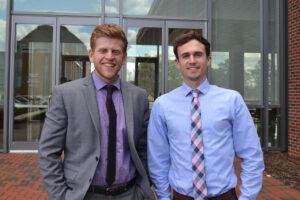Tyler Ramsey (MS-III) has been participating in research for over five years. His first experience in a lab, as is the case with many students, was in college while earning his degree in Chemistry at Appalachian State University. Just a few years later, he and his peers— Carrie Shropshire, Kevin Chambers and Tibor Nagy— can add being published in the Yale Journal of Biology and Medicine (YJBM) to their budding list of contributions to science and medicine.
Student Doctor Ramsey began researching essential oils with his mentor, Principal Investigator Dr. Kenneth Korach, as a Post-Baccalaureate IRTA (Intramural Research Training Award) Fellow at the National Institute of Environmental Health Sciences. Their work gained worldwide recognition when it was picked up by major media outlets—including Time Magazine, Forbes, the BBC and hundreds of others—in March 2018 after Ramsey was invited to present an Oral Presentation and Press Conference at the 100th Annual Endocrine Society’s National Conference in Chicago, IL. In early 2020, Ramsey was selected as a finalist for the National Student Researcher of the Year Award.

The four Campbell medical students collaborated to add an essential step forward for the research – a literature review the YJBM published this month.
“It takes literature reviews to expand on our current knowledge – you need folks doing the research, but you also need people to combine it and see what gaps there are in our current knowledge base and to identify where the research can go for the future,” said Kevin Chambers.
“This was my first larger literature review,” continued Chambers. “Campbell gave us good preparation in our FMP papers where we had the option to do a narrative review – similar to this, but on a smaller scale – to learn the skills you need to effectively sort through the current studies and evaluate them. So, we were prepared to then take that to the next level for our own projects like this one.”
“I enjoyed working on this project because this topic is pretty new and constantly developing. I specifically focused on the psychiatric effects of essential oils – for example, lavender and its association with relaxation,” said Chambers. “I went through the research to see what studies and randomized trials have been done about the different chemical components. There are a couple that have been shown to be anti-anxiety – lavender for example, but there are some that worsen anxiety like lemon. So, when people buy products with these fragrances, they may not know how it is going to affect their mood. Lavender is also starting to be developed in a pill form that is in randomized trials to see if taking it in pill form can reduce anxiety and stress.”
“Essential oils have become a multi-billion-dollar industry over the past decade,” added Ramsey. “Millions of Americans use essential oil containing commodities regularly including soaps, lotions, shampoos, hair-styling products, cologne and laundry detergents. Our society deems essential oils as safe alternatives to more invasive forms of treatment due to the concept that they are more “natural.” However, only a modest amount of research has been conducted on essential oils and most of these products are not regulated by the United States Food and Drug Administration. This leaves the potential beneficial and/or adverse effects of these replacements unclear, making it necessary to investigate these oils in order to verify their true effects on human health.”

“Also, you have to take some of the limitations in essential oils into consideration,” said Chambers. “It is a natural compound, so depending on when you harvest the plants, what time of year they are growing, and where they are growing the chemical structure can be very different. That is one of the barriers in studying these products – if I grow one at my house and you grow one at your house, they can be very different.”
“I was responsible for researching the effects of essential oils on microorganisms,” said Nagy. “Within that topic, I was able to search the literature for the antiviral, antibacterial and anti-fungal properties of many different essential oils.”
Like, Ramsey, Nagy’s previous background in research stems from experiences working with bench research at Appalachian State University, but then took a more clinical turn with stroke rehabilitation at the Medical University of South Carolina, and population research at Southeastern Regional Health emergency department.
“These experiences gave me the foundation to be able to gather and process information from multiple different articles and synthesize it into a manageable summary,” said Nagy. “It is very important to know how to summarize information when it comes to literature reviews and my previous research was key in giving me the tools to embrace such task.”

Carrie Shropshire focused on anti-inflammation and antioxidant properties, insect repelling properties, and drafted many of the figures/tables for the paper.
“Biomedical and clinical research are the foundations of medicine,” concluded Ramsey. “Without these integral segments, medicine would cease to exist and advances in the field would be impossible. Thus, it is important for all physicians to have a firm understanding of research. I have been blessed with many research opportunities in my life and am confident that it will make a significant difference in my quality of care as a future physician.”

